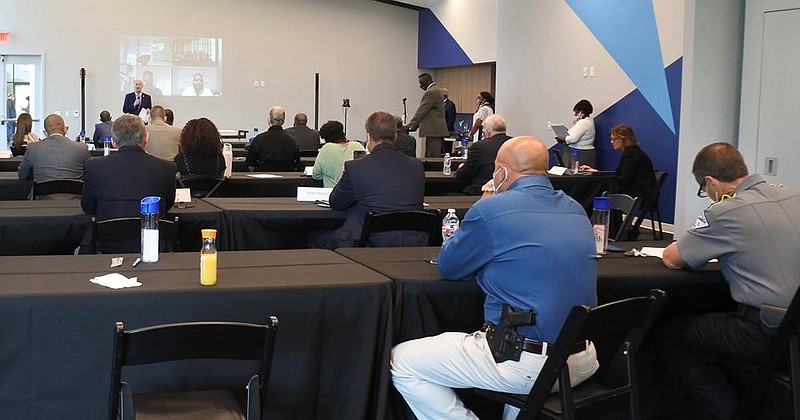FORT SMITH -- A task force whose aim is to make recommendations to improve law enforcement throughout the state had its first meeting on Thursday, with Gov. Asa Hutchinson setting its mission and members sharing their points of interest.
The purpose of the Task Force to Advance the State of Law Enforcement in Arkansas is to study and analyze the best practices and procedures for recruiting, training and maintaining law enforcement officers in the state, Hutchinson said on June 9. It will make recommendations to Hutchinson on "enhancing trust between law enforcement and communities, and improvements or changes needed to enhance the profession of law enforcement to ensure compliance with standards."
This comes in the wake of nationwide protests that followed the death of George Floyd, a black man who died in Minneapolis after a white police officer pressed his knee to Floyd's neck.
At the meeting Thursday, Hutchinson said the reality of the task force is that it is "born out of protest." It is also long overdue, something that Arkansas needs to and should do in terms of fresh examinations at procedures and what it wants to accomplish in law enforcement across the state.
"But the impetus for this task force ... is the fact that the American public, and internationally, saw things on the big screen that troubled them in the depths of their soul," Hutchinson said at the U.S. Marshals Museum in Fort Smith. "And they said, "We need to take a look at how we do things: how we build community relations, how we train and how we hold officers that do the wrong thing accountable.'"
After hearing from both Hutchinson and Fort Smith Mayor George McGill, the members of the task force identified themselves and offered some of their points of interest. Included in the membership are representatives from the fields of law enforcement, training and community activism, as well as community leaders, from throughout Arkansas.
One of these members was Scott Hamilton, chief executive officer and president of the Urban League of the State of Arkansas, a nonprofit organization in Little Rock. Hamilton said he hopes the task force talks about ways to "treat each other as humans."
"And if we do that, I think we will be very successful in moving where we need to be," Hamilton said. "I think we will find ways that everyone in our society can get along better. ... We all have differences. If we think we don't, we're fooling ourselves, and I think as we look at what we're faced with today, I think that if we have an open heart, if we come at this with compassion, if we're willing to listen, if we're willing to negotiate, I think we will be extremely successful, and ... we can lead the way to a much better future here."
An activist who was present was Layla Holloway, who, along with fellow task force member and Van Buren resident Emma Davis, organized "Black Lives Matter Protest: A Demonstration for George Floyd," that took place in Fort Smith on May 31. Holloway said her biggest priority is accountability within the police department in regard to rule breaking.
An example of law enforcement representation was Fayetteville Police Chief Mike Reynolds. Reynolds said the most important thing for him and his community has probably been building trust and legitimacy. This has been done through training, which has changed significantly in Fayetteville over the past 10 years; transparency; and community policing. To Reynolds, it was an honor for him to have this open dialogue with the other task force members to see how they can both better law enforcement and learn how to make systemic change.
At the conclusion of these introductions, the committee took a break and then continued the meeting without the presence of the media.
"What we want to do is have some very open and honest discussion and conversation about things that we hope to make a difference," task force Chairman Fred Weatherspoon said. "And therefore, I feel people will be more apt to speak openly and freely if they're not necessarily being subject to potential scrutiny."
Weatherspoon, who also serves as deputy director of the Arkansas Law Enforcement Training Academy, said he was sure that task force meetings will be opened up at a later date.
